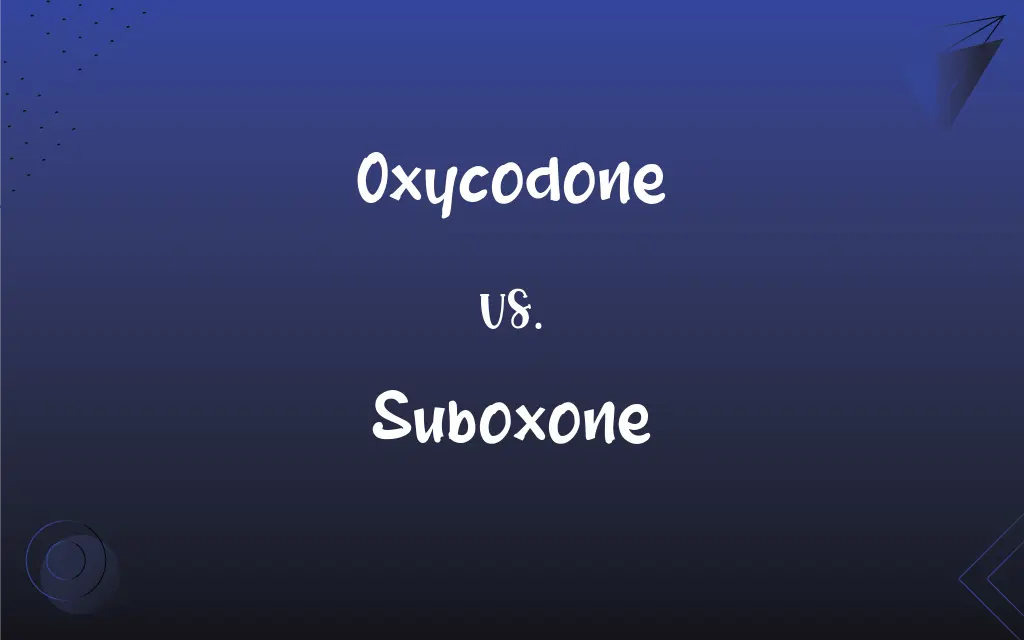Oxycodone vs. Suboxone: What's the Difference?
Edited by Janet White || By Harlon Moss || Updated on October 29, 2023
Oxycodone is a potent opioid painkiller; Suboxone, a combination of buprenorphine and naloxone, is used to treat opioid addiction.

Key Differences
Oxycodone is an opioid pain medication primarily used for managing moderate to severe pain. Suboxone is used in the treatment of opioid addiction, containing buprenorphine and naloxone.
While oxycodone works by binding to opioid receptors to alleviate pain, Suboxone's buprenorphine also binds to these receptors but with less euphoria, and naloxone prevents misuse.
Oxycodone has a high potential for abuse and addiction. Suboxone, however, is designed to lower the risk of abuse and is used in medication-assisted treatment (MAT) for opioid addiction.
Doctors prescribe oxycodone for acute or chronic pain management. Suboxone, on the other hand, is prescribed as part of a comprehensive addiction recovery program.
Oxycodone can lead to dependence and severe withdrawal symptoms. Suboxone helps in managing withdrawal symptoms and reducing cravings in individuals addicted to opioids.
ADVERTISEMENT
Comparison Chart
Primary Use
Pain relief, especially for moderate to severe pain.
Treatment of opioid addiction.
Composition
Single active ingredient: Oxycodone.
Combination of buprenorphine and naloxone.
Mechanism of Action
Binds to opioid receptors, alleviating pain.
Partially activates opioid receptors, reduces cravings.
Potential for Abuse
High potential for abuse and addiction.
Lower risk of abuse, naloxone deters misuse.
Role in Addiction Treatment
Not used in addiction treatment.
Integral in medication-assisted treatment for addiction.
ADVERTISEMENT
Oxycodone and Suboxone Definitions
Oxycodone
An opioid that can be habit-forming with prolonged use.
Due to its addictive potential, oxycodone must be used cautiously.
Suboxone
A sublingual film or tablet used in medication-assisted therapy.
Suboxone films were part of his daily regimen in recovery.
Oxycodone
A medication derived from thebaine, an opioid alkaloid.
Oxycodone, synthesized from thebaine, effectively relieved his pain.
Suboxone
A medication combining buprenorphine and naloxone, used for opioid addiction treatment.
His treatment for opioid dependency included Suboxone.
Oxycodone
A narcotic medication used in moderate to severe pain.
He was given oxycodone to manage his chronic back pain.
Suboxone
A drug that reduces opioid withdrawal symptoms and cravings.
Suboxone helped her manage withdrawal symptoms effectively.
Oxycodone
A powerful opioid analgesic for pain management.
The doctor prescribed oxycodone after her surgery for pain relief.
Suboxone
A partial opioid agonist-antagonist used in addiction medicine.
As a partial agonist-antagonist, Suboxone is safer for long-term use.
Oxycodone
An oral analgesic available in various formulations.
She was prescribed a controlled-release formulation of oxycodone.
Suboxone
A controlled substance with a lower risk of misuse compared to other opioids.
Due to its design, Suboxone has a lower potential for abuse.
Oxycodone
A semisynthetic opioid drug, C18H21NO4, used in its hydrochloride form as a pain reliever, often in combination with nonopioid analgesics such as acetaminophen.
Suboxone
(medicine) A combination of buprenorphine and naloxone, used to treat opiate addictions.
Oxycodone
(pharmaceutical drug) A synthetic analgesic drug (trademark OxyContin) that is similar to morphine in its effects.
FAQs
What is oxycodone?
Oxycodone is a potent opioid painkiller used to manage moderate to severe pain.
What are the risks of using oxycodone?
Risks include addiction, dependence, respiratory depression, and overdose.
Can oxycodone lead to withdrawal symptoms?
Yes, abrupt discontinuation of oxycodone can lead to severe withdrawal symptoms.
Can oxycodone be addictive?
Yes, oxycodone has a high potential for abuse and can be addictive.
Can oxycodone be taken for chronic pain?
Yes, oxycodone can be prescribed for chronic pain, but with careful monitoring.
What is Suboxone?
Suboxone is a combination of buprenorphine and naloxone, used in the treatment of opioid addiction.
What makes Suboxone different from other opioids?
Suboxone contains naloxone to deter misuse and is a partial opioid agonist, making it less euphoric and addictive.
Is Suboxone a controlled substance?
Yes, Suboxone is a controlled substance due to its buprenorphine content.
What should be avoided while taking oxycodone?
While taking oxycodone, one should avoid alcohol, driving, and other CNS depressants.
Is Suboxone effective in treating all opioid addictions?
Suboxone is effective for many, but not all, and should be part of a comprehensive treatment plan.
How is Suboxone administered?
Suboxone is usually administered sublingually as a film or tablet.
Can you develop tolerance to oxycodone?
Yes, prolonged use of oxycodone can lead to tolerance and dependence.
Can Suboxone cause side effects?
Yes, Suboxone can cause side effects like nausea, headache, and constipation.
Can Suboxone help with opioid withdrawal?
Yes, Suboxone can help manage withdrawal symptoms and reduce cravings.
Is Suboxone a long-term treatment option?
Suboxone can be used as a long-term treatment option under medical supervision.
What happens if you overdose on oxycodone?
Overdosing on oxycodone can lead to respiratory failure, coma, and death.
How does Suboxone help in opioid addiction recovery?
Suboxone helps by reducing cravings and withdrawal symptoms, aiding in recovery.
Is oxycodone used in addiction treatment?
No, oxycodone is not used in addiction treatment; it's primarily for pain relief.
Does oxycodone affect the respiratory system?
Yes, oxycodone can depress respiratory function, especially in high doses.
What role does naloxone play in Suboxone?
Naloxone in Suboxone helps prevent misuse by causing withdrawal if injected.
About Author
Written by
Harlon MossHarlon is a seasoned quality moderator and accomplished content writer for Difference Wiki. An alumnus of the prestigious University of California, he earned his degree in Computer Science. Leveraging his academic background, Harlon brings a meticulous and informed perspective to his work, ensuring content accuracy and excellence.
Edited by
Janet WhiteJanet White has been an esteemed writer and blogger for Difference Wiki. Holding a Master's degree in Science and Medical Journalism from the prestigious Boston University, she has consistently demonstrated her expertise and passion for her field. When she's not immersed in her work, Janet relishes her time exercising, delving into a good book, and cherishing moments with friends and family.































































